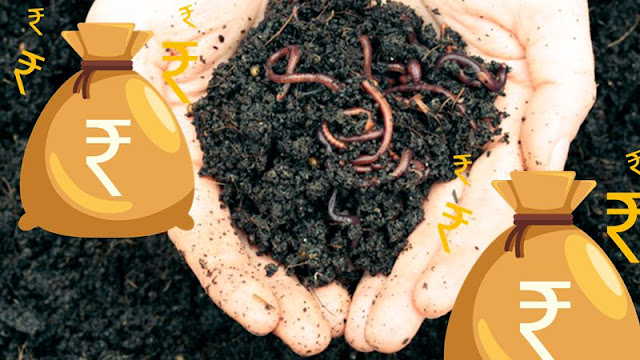A Success Story of Mr. Bharath Hemanth, M.Tech. Professional from Karnataka.
“Vermicompost” is organic manure prepared by using earthworms, dung and organic wastes. Vermicomposting technology as long been recognized as a source of creating self-employment, revenue generation vis- a-vis a source of organic fertilizer and Govt. of India is promoting organic manure production through various schemes for making “wealth from waste”.
Keeping in view the above facts and benefits of vermicompost technology, a youth, Mr. Bharath Hemanth, a M.Tech professional in Aircraft Design from Kolar district of Karnataka got interest in vermicompost production technology as a suitable method of producing organic manure as a source of self-employment and promote the technology to increase farmer’s income. He learnt the knowledge of vermicompost production from SRS of ICAR-NDRI, Bengaluru.
He purchased two species of earth worms viz. Eisenia foetida (red worm) and Eudrilus eugeniaei (African Nightcrawler) from our Station. An interesting fact that, he does not own any dairy farm and he was concerned, how to get cow dung for vermicomposting and initially he was hesitant to start.
Upon discussion with Scientists of SRS, he was suggested to collect cow dung at a regular interval from dairy farmers in and around his village. Based on our suggestion, he adopted the procedure and formed a network among dairy farmers for regularly obtaining cow dung for vermicomposting. He used 4.5 acre of grand-parent’s land under mango orchard for vermicompost production at his village Vokkaleri which is about 12 km from Kolar. He established two types of vermihouse consisting of 6 vermibeds of size 10 feet in length, 3 feet in width and 2 feet in depth of pre-fabricated ones which are commercially available in market. Another type of vermihouse consisting of 4 vermibeds measuring 40 feet in length, 3 feet in width and 2 feet in depth were also made by him using factory rejected silk fabric spread between sticks fixed to the ground and stiffened to shape by using GI wire. Shade net was held by wooden poles fixed to ground. He is now able to produce every month around one ton of vermicompost made purely out of cow dung. As in any product, here too ‘demand’ is one of major deciding factors for success of commercial vermicomposting.
He felt there was less demand among the agriculture farmers for vermicompost in and around his village. He was suggested to explore the marketing opportunities in the urban Bengaluru area where there is a huge demand for use in nurseries, kitchen garden, and roof garden. In addition, to have an identity for his product, he was given guidance to register a trade name and good packaging system with nutritional quality and benefits of vermicompost printed on the pack. He further ventured into e-trading by creating his own website www.farmoxagri.com. With his start-up venture, he is selling about 1 ton every month at a cost `10/kg. He is able to get a net income of `6000 every month through sale of vermicompost.
Mr. Bharath shared his path of success by quoting that “Charity is not sustainable, there has to be a business model” as stated by Shri. Devi Prasad Shetty, founder of Narayana Health and he decided to make the venture profitable. He also registered a private limited company by the name “Farmox Agriculture Solutions” and started selling vermicompost at a profitable price in packages of 1, 5 and 25 kgs to nurseries and other customers in the name of ‘Farmox’. He further states that, vermicomposting is not only less capital intensive, but it has many advantages like faster capital recovery, ease of maintenance, less operational cost. Mr. Bharath remembers and concludes by saying that, “the entrepreneurial opportunities of vermicompost technology, and the dire need to enrich our agricultural lands made possible by SRS of ICAR-NDRI, Bengaluru which, of course made my dream come true”.
Source: ICAR Institute NewsLetter (S. Jeyakumar and K. P. Ramesha)













